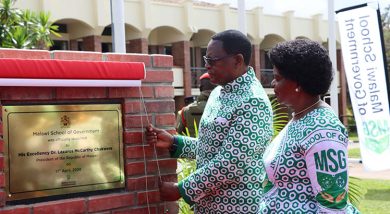IMF urges for donor aid for Malawi
 The IMF has asked Malawi’s key donors to unlock millions of withheld dollars to support the country’s forthcoming financial year as authorities negotiate for a new financing agreement with the Fund.
The IMF has asked Malawi’s key donors to unlock millions of withheld dollars to support the country’s forthcoming financial year as authorities negotiate for a new financing agreement with the Fund.
The IMF’s mission chief to Malawi, Tsidi Tsikata, said in an exclusive interview in Washington DC on Sunday that indications from donors on how much they are willing to release in the next financial year would help government to plan and formulate its 2012/13 national budget.
“We are keeping the World Bank, the African Development Bank and Western donors informed about the progress being made in our negotiations for a new programme and we are telling them to at least commit how much support they will give Malawi to make it easier for authorities to plan their budget in terms of financial resources,†said Tsikata.
Malawi’s new financial year starts in July and the country desperately needs donor financing to stabilise its balance of payment account worsened by an aid freeze and dwindling earnings from tobacco, the country’s mainstay.
Malawi has not received budget support from donors since January last year, creating a budget gap of $121 million in the current fiscal year.
Tsikata said the International Monetary Fund (IMF) and a Malawi delegation began discussions for a new programme on the sidelines of meetings of the IMF and World Bank in Washington last week.
He said an IMF mission would travel to Malawi before the end of May to discuss details of an economic programme, which would be supported by an IMF loan.
The Fund had suspended a three-year $79 million loan after the programme went off track when government failed to devalue the kwacha and implement public finance management reforms.
Said Tsikata: “We should be going back to Malawi in a matter of weeks, at least before the end of May….But what we need is some clarity on the 2012/13 budget and we want to give the authorities some time to do that.
“We know how quickly Malawi wants the programme but what is important to us is the formation of the budget.â€
Newly sworn in President Joyce Banda, since taking office earlier this month, has made as one of her key goals to restore donor confidence.
“The President has expressed her desire to work with us to return to a path of macroeconomic reform and we very much look forward to doing that,†said Antoinette Sayeh, IMF director of the Africa Department, speaking to Reuters on the sidelines of the IMF-World Bank meetings.
The late Mutharika, who was laid to rest on Monday, was blamed for an economic crisis that stemmed from a diplomatic dispute with Britain. After clashing with Mutharika over his economic policies and heavy-handed repression of dissent, Britain and other donors froze their budget support which normally accounts for about 40 percent of government spending.
This has resulted in pressure building on the kwacha, forcing the authorities to devalue the currency by 10 percent last year to K165 to a dollar but still shy of the black market rate of about K300.
Tsikata, when asked on whether IMF will still insist on authorities devaluing the kwacha, said: “It’s not a question of whether Malawi needs to devalue the kwacha or not… Everyone knows that everything is now being based on the black market rate, commodities prices have gone up and that’s the reality for Malawi.â€





